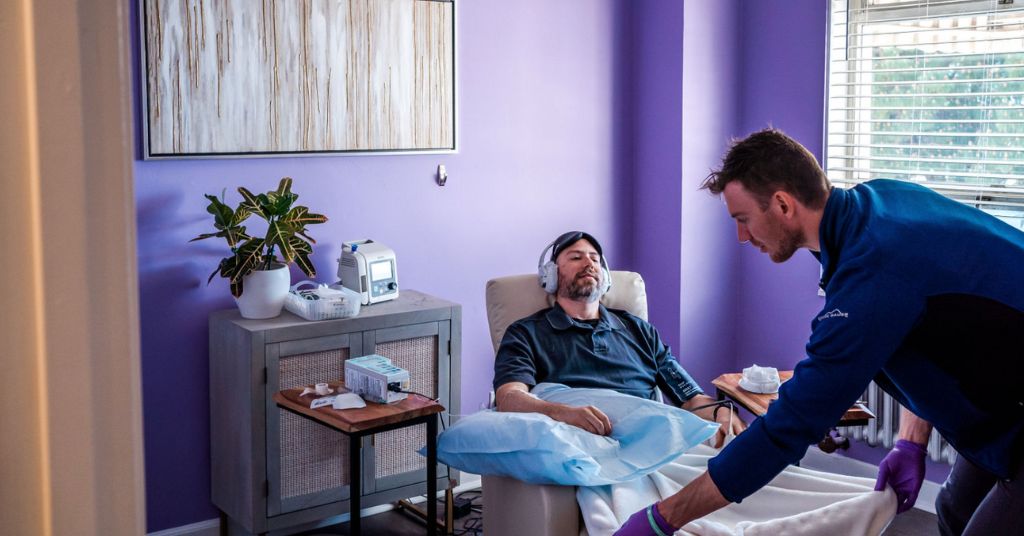
Depression affects millions of people worldwide, and while many find relief with medication or psychotherapy, others continue to struggle with persistent symptoms. For those who do not respond to traditional methods, Transcranial Magnetic Stimulation (TMS) has emerged as a safe, non-invasive alternative. By using magnetic pulses to stimulate underactive areas of the brain, TMS therapy for depression has delivered promising results, especially for treatment-resistant cases.
This guide explores the success rates of TMS therapy, how it compares to other treatments, and what you can expect if you’re considering this advanced option.
TMS is an FDA-approved procedure that delivers focused magnetic pulses to the prefrontal cortex, the area of the brain linked to mood regulation. Unlike medications, which affect the entire body, TMS directly targets neural activity, improving symptoms without systemic side effects.
Many patients turn to TMS when antidepressants or talk therapy haven’t provided enough relief. For those searching for options such as TMS Treatment For Depression Near Me, the therapy has become increasingly accessible across the U.S.
Studies show that TMS therapy success rates are encouraging, particularly for individuals with Major Depressive Disorder who have not improved with other treatments. Clinical trials and real-world data suggest that:
Between 50% and 70% of patients experience significant improvement in depression symptoms.
Roughly 30% achieve full remission, meaning their depression symptoms disappear entirely.
Most patients report noticeable relief within the first two to four weeks of treatment.
These results highlight the strong TMS therapy efficacy compared to standard options, especially for treatment-resistant depression. While outcomes vary depending on the severity of symptoms and overall health, many patients find long-term stability with maintenance sessions.

Over the years, multiple TMS approaches have been developed to improve results and customize care. Each protocol has shown success across different patient groups.
rTMS is the most widely used protocol, delivering repeated pulses to the prefrontal cortex. Studies show an rTMS success rate of 50%–60%, with many patients noticing gradual improvement after 20–30 sessions. This method is particularly effective for mild to moderate depression and provides lasting results when combined with ongoing care.
Deep TMS uses a specialized coil to stimulate deeper brain structures linked to severe depression. Research indicates that dTMS success rates can reach 60%–70%, making it a strong option for patients who have not responded to other treatments. Many describe clearer thinking, reduced depressive symptoms, and improved daily functioning after completing a dTMS protocol.
iTBS is a newer approach that delivers bursts of pulses at a higher frequency, allowing shorter sessions while maintaining effectiveness. Clinical studies suggest iTBS success rates are similar to rTMS (50%–60%), but patients often notice results faster, sometimes in just 10–15 sessions. This makes iTBS an appealing option for individuals seeking efficient treatment without compromising outcomes.
When evaluating how effective TMS is for depression, it helps to compare it with other established methods.
SSRIs and SNRIs remain first-line treatments, but many patients report partial or no relief, along with side effects such as weight gain, sexual dysfunction, and insomnia. TMS, by contrast, avoids these systemic side effects and has demonstrated higher long-term effectiveness rates in treatment-resistant cases.
Ketamine works quickly, often improving symptoms within hours, but its effects are short-lived and require repeated infusions. Some patients also experience dissociation or other side effects. TMS provides slower but steadier progress, with more consistent results and no risk of dependency.
ECT is highly effective but invasive, requiring anesthesia and often leading to memory loss. TMS is non-invasive, performed while the patient is awake, and carries minimal side effects. For many, TMS strikes a balance between effectiveness and safety, making it a preferred option.
If you’re evaluating different treatments, visiting a trusted TMS Clinic Near Me can help you understand which approach best fits your situation.

One of the most common questions is: “How many TMS treatments until I feel better?” While every patient is different, most protocols involve 20–30 sessions over four to six weeks. Many patients begin to notice improvements in mood, energy, and motivation by the second or third week.
The long-term results of TMS therapy are also encouraging. Studies show that benefits can last for months or even years, especially when patients continue with maintenance treatments or combine TMS with therapy and healthy lifestyle habits.
While TMS is most widely used for depression, research also supports its benefits in other conditions. Patients with anxiety, PTSD, and OCD have reported significant improvements after treatment. In fact, some clinics now offer specialized TMS Therapy For Anxiety, which targets brain areas linked to worry and hyperarousal. This highlights the versatility of TMS as a tool for improving overall mental health.
When it comes to treatment-resistant depression, TMS therapy success rates make it one of the most effective non-invasive options available today. Whether delivered as rTMS, dTMS, or iTBS, the therapy consistently helps patients find relief when other methods have failed.
At HWS Center, we specialize in tailoring TMS therapy for depression to meet each patient’s unique needs, ensuring the highest chance of success. If you’ve been searching for a safe, proven alternative to medication, TMS could be the breakthrough you’ve been waiting for.
Take the first step toward lasting relief, explore the TMS Clinic Near Me at HWS Center, and discover how advanced TMS treatments can help you reclaim your life.
Schedule a consultation! Provide your contact information below and we’ll get back to you as soon as we can.
The success rate of TMS therapy varies depending on the severity of depression and individual patient factors, but studies consistently show that about 50% to 70% of patients experience meaningful improvement. Around one-third of patients achieve full remission, meaning their depression symptoms disappear completely. These results highlight TMS therapy effectiveness as a reliable option for people who have not found relief with traditional treatments.
TMS therapy for depression is highly effective, especially for individuals with treatment-resistant depression. Research shows that patients often start feeling better within two to four weeks of starting treatment. Compared to antidepressants, TMS therapy results are more consistent and come with fewer side effects, making it a preferred long-term option for many.
Most patients require 20 to 30 sessions over four to six weeks, with noticeable improvements beginning by the second or third week. While some individuals may need more sessions depending on their condition, the structured treatment plan is designed to build progress over time. Maintenance treatments can help extend the benefits, supporting long-term recovery.
TMS therapy offers long-term results for many patients, with benefits lasting months or even years. Follow-up studies have shown that people who complete a full course of treatment maintain improved mood and cognitive function over time. For those who experience recurrence, shorter maintenance courses can restore results quickly.
Yes, TMS therapy is not only effective for depression but has also shown positive results for anxiety disorders. By targeting brain regions involved in worry and hyperarousal, TMS can reduce symptoms of anxiety and improve overall mental health. Many clinics now offer specialized TMS protocols for anxiety alongside depression treatment.
Unlike medications, which often cause side effects, or ECT, which requires anesthesia, TMS therapy is non-invasive and well-tolerated. The TMS therapy success rate is often higher for patients who did not benefit from antidepressants, making it a strong alternative. Patients also report feeling clearer and more focused, which adds to its overall effectiveness.
While TMS therapy has a strong success rate, it does not work for everyone. Some patients experience partial improvement, while others may not respond at all. The effectiveness of TMS therapy often depends on factors like the severity of depression, overall health, and whether other conditions such as anxiety or PTSD are also present. A consultation at a TMS clinic can help determine if you are a good candidate.
TMS therapy is generally well-tolerated and considered safe. The most common side effects are mild and temporary, including scalp discomfort or headaches during treatment sessions. Unlike medications or ECT, TMS does not cause weight gain, sexual side effects, or memory loss. For many patients, the minimal side effects of TMS therapy make it one of the most appealing options for long-term depression management.
Look for licensed therapists, psychiatrists, or a mental health treatment center specializing in personalized treatment plans for major depressive disorder and other mental health conditions.
We use cookies to improve your experience on our site. By using our site, you consent to cookies.
Manage your cookie preferences below:
Essential cookies enable basic functions and are necessary for the proper function of the website.
Google reCAPTCHA helps protect websites from spam and abuse by verifying user interactions through challenges.
Google Tag Manager simplifies the management of marketing tags on your website without code changes.
You can find more information in our Cookie Policy and Privacy Policy.